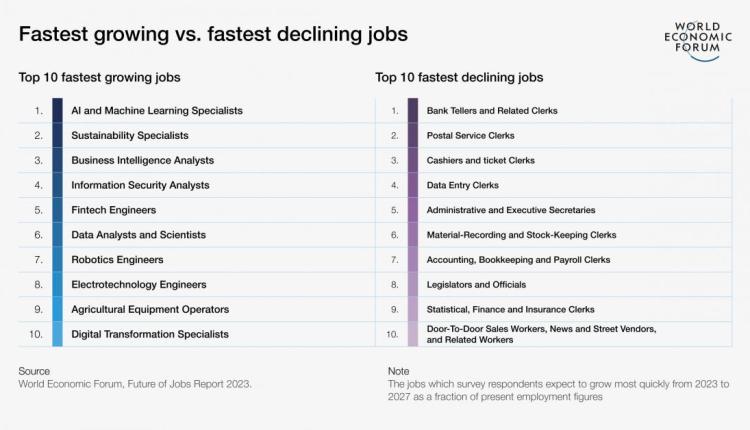Embracing the Future: Pakistan’s Workforce Adapts to Emerging Opportunities and Technological Disruption
Fastest Growing and Eliminating Jobs
Pakistan is at a crucial juncture in its economic development, with the need to adapt to the changing landscape of job opportunities and technological disruptions. The World Economic Forum’s Future of Jobs Report 2023 highlights the importance of upskilling and reskilling the workforce in high-demand areas such as Artificial Intelligence (AI) and big data.
Adapting to Emerging Opportunities
As the global economy continues to evolve, certain job roles are experiencing rapid growth while others are becoming obsolete. In Pakistan, there is a growing demand for professionals with skills in AI and big data analysis. Companies are increasingly relying on these technologies to gain insights, optimize processes, and make data-driven decisions.
By investing in upskilling and reskilling programs, Pakistan can equip its workforce with the necessary skills to thrive in this new digital economy. This will not only benefit individuals in securing employment opportunities but also contribute to the overall economic growth and competitiveness of the country.
Technological Disruption and Job Elimination
With the rise of automation and AI, certain job roles are at risk of being eliminated. Jobs that involve routine tasks or manual labor are becoming increasingly automated, leading to a decrease in demand for such roles. However, this also opens up opportunities for individuals to transition into new roles that require more specialized skills and knowledge.
It is essential for Pakistan to identify the jobs that are at risk of being eliminated and provide support for these individuals to reskill and transition into new roles. This will require a concerted effort from both the government and private sector to ensure a smooth transition for workers affected by technological disruptions.
Impact on Individuals
For individuals in Pakistan, embracing the future of work means being proactive in seeking out opportunities for upskilling and reskilling. By acquiring in-demand skills such as AI and big data analysis, individuals can position themselves for success in a rapidly changing job market. This will not only enhance their employability but also open up new career pathways and opportunities for growth.
Impact on the World
The adaptation of Pakistan’s workforce to emerging opportunities and technological disruption has broader implications for the global economy. As Pakistan invests in upskilling and reskilling its workforce, it will contribute to the development of a more competitive and innovative workforce on a global scale. This will not only benefit Pakistan but also drive economic growth and development in the region and beyond.
Conclusion
As Pakistan navigates the challenges and opportunities presented by the changing landscape of job opportunities and technological disruptions, investing in upskilling and reskilling the workforce is essential. By embracing the future and equipping individuals with the necessary skills, Pakistan can position itself for success in the digital economy and contribute to global economic growth and competitiveness.





